Exporters are consolidating their presence in Latin American markets

Lower European and pear stocks and a good quality crop augur well for the start of the new Argentine topfruit campaign. The South American country will be looking to recover some of it lost market share after seeing a significant drop in exports to key European markets last year.
According to the latest figures from the World Apple and Pear Association (Wapa), European apple stocks in December were 4.2 per cent lower than at the same point in 2022 at 4.292m tonnes, while pear stocks were down 2.2 per cent at 661,519 tonnes.
While Argentina’s position in Europe has been eroded in recent years due to loss of competitiveness and a lack of varietal renewal, intra-regional trade with other Latin American markets has strengthened due to increased consumer demand. Last year, Argentina saw a big jump in apple and pear exports to Brazil and other regional markets, which helped compensate for the sharp declines seen in traditional markets like Europe.
The most recent figures from Argentine Chamber of Integrated Fruit Producers (Cafi) show exports of Argentine apples to Brazil grew 54 per cent to 22,389 tonnes between January and October 2023 compared to the year-earlier period. Shipments to Bolivia and Paraguay – the second and third biggest markets – grew 20 per cent and 79 per cent to 10,663 tonnes and 8,948 tonnes respectively.
In pears, the data shows a 35 per cent jump in shipments to Brazil between January and October 2023 compared to the year-earlier period, with exports reaching 120,093 tonnes. The Russian market grew 28 per cent to 56,058 tonnes.
The increases were partly due to a recovery in production following weather related shortages in 2022.
Exports to Europe registered a general downward trend – Italy took 25 per cent fewer pears at 12,728, while shipments to the Netherlands, France and Germany fell by 56 per cent, 47 per cent and 33 per cent respectively.
“Brazil has always been our main market, but over recent years we’ve also been consolidating our presence in other Latin American markets like Colombia and Peru. We have important customers there that we supply practically all year round,” says Ariel Sabbag of Rio Negro-based topfruit and stonefruit grower-exporter Emelka.
“This year we’re expecting a good pear harvest and a normal season for apples. For now we see very good quality with medium calibres. Up to now there have been no major weather events that can affect quality significantly so we are confident of a good crop.
“The fact that European stocks are lower is encouraging, but it’s very difficult to know how the markets will react because this not only depends on stock levels but also on demand. But overall we’re optimistic.”
Emelka is a third generation, family-run company and one of the biggest exporters of Abate Fetel pears. Three years ago , it added cherries to its portfolio after acquiring a rival producer in the Valle Medio. More recently, it has moved into the nursery business, producing cherry, plum and apple trees for its own orchards.
This year the company’s investments have focused on installing anti-hail nets to improve the quality of its offer and upgrading its coldstorage facility.
Sabbag says another reason for optimism is the recent election of Javier Milei. “All the indications are that the new government will support the fruit sector and countryside in general,” he says.
“The challenge to improve Argentina’s competitiveness is huge but we think there are good possibilities to improve certain aspects of the sector and strengthen our position. Until now all the speeches Milei has made indicate that he will support the productive sector so in the coming months hopefully we’ll see these projects enacted.”



